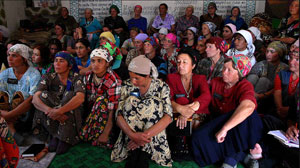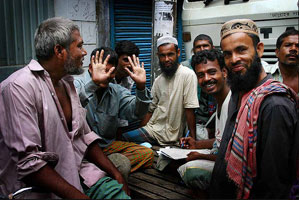Church Planting Movements: What Have We Learned?

Note by Rick Wood: In the April 2000 issue of Mission Frontiers we reprinted the booklet, Church Planting Movements by David Garrison because of the key insights it held for the rapid multiplication of church fellowships in diverse regions of the world. You can read this booklet by going to missionfrontiers.org. David Garrison and his colleagues have had an additional 10 years to study and learn what makes these Church Planting Movements possible. We present the fruits of their research and experience in this issue in the hope that missionaries all over the world can apply these principles of rapid church multiplication so that every person on earth may have the opportunity to follow Jesus through a biblical fellowship of believers near his home. I want to express my thanks to David Garrison for his help in gathering the articles for this issue from his extensive network of experienced CPM practitioners.
Introduction by David Garrison
IYKDWYBDYKGWYBG – If You Keep Doing What You’ve Been Doing, You’ll Keep Getting What You’ve Been Getting. These are the words on a poster that greets many missionaries as they commence Church Planting Movements training. It has become something of a mantra that renowned CPM trainers, Bill Smith and Neill Mims, have used to jolt frustrated missionaries out of their fruitless patterns and into new ways of looking at their community and ministry.
Bill Smith, the veteran of CPM trainers, is famous for telling people what they don’t want to hear, but need to hear. Someone described Smith as the rock that others break themselves on, but it is a happy breaking that has left in its wake thousands of new churches among the world’s least-reached peoples.
Smith and Mims are unapologetic about their view that God does want to see untold millions come to faith in Jesus Christ, and that business as usual is simply not an option. As much as we may wish that God would bend to our methods or that the lost would leap up and demand, “What must I do to be saved?” more often than not, it is we – rather than God or the lost – who need to change.
I asked Smith and Mims to share with us what they have learned in their study and training of CPM practitioners over the past two decades.

Over the years we have seen dozens of church-planting movements in a variety of contexts all around the world. There are consistent patterns and themes that we see in these movements.
Five elements. In every CPM we continue to see five reproducing elements:
- Effective, reproducing bridges that lead to massive gospel witness
- Effective, reproducing gospel presentations
- Reproducing discipleship that turns new believers into CPM partners
- Rapidly reproducing churches
- Reproducing leadership development
Evangelism
Very large numbers of lost hear the gospel from believers. CPMs always have a massive number of ordinary believers personally sharing the gospel, what we call M2E – Mouth to Ear.
Rapid conversion of new believers to partners. Fear that people are not ready is a lack of trust in God’s ability. CPM practitioners quickly incorporate new believers into the movement through baptism, training in such doctrines as “the priesthood of the believer,” and accountability-based discipleship such as the T4T 1/3 x 1/3 x 1/3 meetings.1
Incredible boldness. In CPMs local believers die to self and become bold witnesses, especially in the face of persecution.
Church, Church, Church
 Planting churches is top priority. Whatever ministry or witness generated must lead to church formation and multiplication. The gates of hell may prevail against every other ministry and institution, but not against the Church. The Church must be viewed as people, not facilities, organization or a place of worship.
Planting churches is top priority. Whatever ministry or witness generated must lead to church formation and multiplication. The gates of hell may prevail against every other ministry and institution, but not against the Church. The Church must be viewed as people, not facilities, organization or a place of worship.
There is more to life than the Spirit. Material and social needs are a part of life. If you ignore the felt needs of the people, don’t expect a warm reception for the gospel. At the same time, it is imperative that ministries to widows, orphans, the poor and those who are in need be intimately tied to the church and church planting.
Leaders, Leaders, Leaders
Build reproducing leaders. Build and empower local leaders. Everyday think about this: What if I have to leave? Who will take over? At the same time, don’t over-train. Find nationals with apostolic gifting and put them to work. Trust God and expect to find anointed people who will rise up and far exceed you in giftedness. Use them!
Intentional personal and intensive leadership training. CPM practitioners offer frequent and intense training events, pouring lots of Bible and practical training into the emerging leaders of movements. Never go anywhere without taking young leaders with you. Teach by example and make them do the work. If you don’t have a lot of foreign workers to help you, rejoice! Train locals for the work.
Vision casting with accountability. In most CPMs the role of the expat is not the out-front leader, but the one who models, encourages, challenges, mentors, equips and holds national partners accountable to implement the CPM vision.
Provide inspired leadership! Celebrate the victories! Make sure you recognize and reward behavior you want repeated. Build a system of leadership that puts those who have performed well into positions of authority.
Counter-Intuitives
Restore others’ discards. It is worth remembering that national CPM leaders don’t drop down out of heaven, they climb up out of hell. People who make mistakes, commit sins, and are sometimes branded as “no good” may be the instruments of a movement. Don’t be afraid to take a chance on them. Sure, you will get “burned,” but you will also find some gems.
More important than contextualization. Foreigners will remain foreign no matter how contextualized they become. Contextualization has an important role to play, but there are even more important things that you can do such as loving the people, training the people, and faithfully casting a passionate vision for seeing them come to Christ.
Don’t let the critics get you down. The more successful you are, the more Satan will send detractors against you. Don’t let it distract you from the main thing. Learn from the legitimate complaints and forget the “sour grapes.”
Personal Disciplines
 Pray! Pray! Pray! CPM practitioners are persons of prayer, but remember that Spirit-led action is simply prayer in motion. Keep moving!
Pray! Pray! Pray! CPM practitioners are persons of prayer, but remember that Spirit-led action is simply prayer in motion. Keep moving!
Remember who you are. Remember how vulnerable, prone to mistakes, easily deceived, and sinful you are, and will continue to be. Grace is the only hope for your people, and it is the only hope for sinners like yourself (1 Corinthians 2:1-5).
Servant leadership. Avoid the superiority complex that sometimes besets missionaries. Insist upon and model servant leadership as the Christian norm.
Avoid the glory. When you do succeed, people will want to celebrate you and make more of you than you are. There comes a time when you just have to say, “No.” Like your salvation, your opportunity to be part of a movement is a gift from God. Be thankful!
Be desperate for God and for His kingdom! Expect God to be your source, and proceed with that in mind. Never let lack of resources limit you. The resources are in the harvest.
At the end of the day, it is the man and woman of God and not the method that God blesses. The final two items in this list describe the life of one of the most prolific and effective CPM practitioners we have known.
He is significantly different from most other missionaries. He stays narrowly focused on those activities that lead to more new believers, more trainers, and more new groups. On the flip side of this, he rarely does many of the traditional things that “normal” missionaries fill their time with: email, surfing the internet, prayer letters, newsletters, administration and bureaucratic reports. He avoids email and says no to a massive number of invitations and requests that would divert his energy to low-priority meetings or activities. He even shies away from spiritual and staff development retreats, family life conferences, and the myriad other good things that suck away time and impose themselves on missionaries.
Pray, witness, train. He and his wife are persons of prayer and consequently those he trains are also. He witnesses incessantly to the majority of lost people he meets and so do his trainees. He trains several times a day and many times a week and insists that new believers immediately witness and begin training their newer believers to do the same. He has a very simple set of materials, but the secret is not the materials, it is the process. He is high-energy; low-energy people simply do not see these kinds of movements. Vacations, days off, margin and balance are not part of his vocabulary.









comments